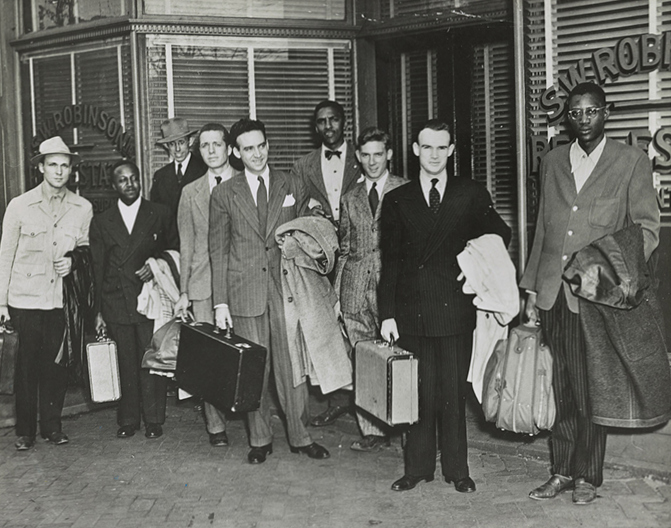To honor the twin anniversaries of Bayard Rustin’s death (August 24, 1987) and the March on Washington (August 28, 1963) that Rustin co-organized, we are republishing this piece that originally appeared in the centennial edition of Fellowship magazine in 2015.
A people do not throw their geniuses away. And if they are thrown away, it is our duty as artists and as witnesses for the future to collect them again for the sake of our children and, if necessary, bone by bone.
Alice Walker, Zora Neale Hurston: a Cautionary Tale and a Partisan View

There is no question that organizations, being of human creation and perpetuation, are as fallible as the individuals involved in them. Being fallible, or unconscious, or disconnected from God (as different traditions and spiritualities may understand this aspect of existence), humans have needed practices and processes for acknowledging the harm they have caused and making it right. These practices have begun with consciousness-raising and responsibility-taking actions and have concluded in making amends to clean up the karmic dimensions reverberating from any particular thought, word, or deed.
Organizations, then, must utilize similar practices to right harm that has been caused by the collective. Now is such a time for the Fellowship of Reconciliation. In this Centennial moment, as we look back at the last 100 years, it is clear that we must engage in honest confession, apology, and reconciliation with respect to the FOR organizational memory and legacy of Bayard Rustin.
From 1942 to 1953, Bayard Rustin was employed by the Fellowship of Reconciliation as a key staffer. His leadership and contribution to the work of peace and civil rights through FOR are unquestionably significant, including the development and execution of the Journey of Reconciliation which sought to test the Supreme Court decision that struck down segregation on interstate bus travel. The Journey of Reconciliation was the forerunner of later “Freedom Rides” and proved a creative and critical piece of the architecture of the civil rights era.
Rustin learned the concept of satyagraha in India and introduced it to American civil rights leaders, perhaps foremost among them, Martin Luther King, Jr. He served years in prison as a consequence of his profound commitment to peace, his refusal to serve as part of the war machine, and his willingness to “tuck [his body] in places so wheels don’t turn.”
A.J. Muste, FOR’s executive secretary at the time, was an early supporter of Rustin’s pacifist activism, corresponding with him while he was imprisoned as a result of resisting conscription, and a mentor to him as a member of the staff of the Fellowship of Reconciliation. By all reports, there was mutual love and respect between the two men.
However, Muste was not able to support Rustin in the fullness of his identity, and Muste’s letters to Rustin show that he advised Rustin to “integrate [his] personality” and suppress his sexual nature for the greater good of the movement. In 1953, following Rustin’s arrest in California for homosexual activity, Muste asked Rustin to resign from FOR, which Rustin did the next day.
Though War Resisters League stepped in and hired Rustin almost immediately, even over Muste’s objection, Rustin entered a period of great loss. FOR had been a professional and spiritual home for him for over a decade, and the friendships and identity associated with FOR were gone. Though Rustin collaborated with Muste in succeeding years, the paternal connection with FOR’s leader was gone. (Bayard Rustin, American Dreamer, p. 34).
There is no question that a grave harm based on bias, ignorance, and religious righteousness was done to Bayard Rustin by the Fellowship of Reconciliation, and an apology is in order and overdue.
The Fellowship of Reconciliation is an interfaith organization now and had begun incorporating that identity then, but in Muste and Rustin’s era, the dominant theological framework of the FOR was Christian. As a clergyman, Muste was situated in the worldview of the Reform tradition of that time in which homosexuality was viewed as a behavioral choice and the exercise of that choice was tantamount to a moral failing. Rustin, for his own part, did not conceptualize his justice work as intersectional freedom fighting inclusive of liberation for non-heteronormative persons.
This is in no way to minimize the harm caused to lesbian, gay, bisexual, and transgendered persons by societal and religious norms of that time, or the reverberations of harm through the ensuing decades to the queer community particularly and the human community generally. Nor is it to say that Rustin at any time denied his own sexuality. It is to situate the meaning of the apology in the theological tradition and era in which the harm occurred and to say that Rustin’s work in creative nonviolence did not specifically focus on the struggle for liberation in the lesbian, gay, bisexual, and transgendered community.

In this context of the middle part of the last century in a Christian-dominated institution, the term “apology” refers to a process that begins with repentance and culminates in reconciliation.
In the Christian tradition, repentance can be understood either as “turning around” (Greek strepho) or “changing one’s thinking and consequently one’s heart” (Greek metanoia). This is an important distinction because strepho, which is most often translated from the Hebrew tshuva or shuv, reflects the action of turning fully toward God and away from evil acts. It assumes an initial intentionality in an action that caused harm, and an intentional turning away from that action and toward wholeness. Metanoia, most often translated from the Hebrew nacham, reflects an unconsciousness or lack of knowledge about true sacred reality which results in harm caused, but which is remedied through coming to terms with falseness and being reborn to a new understanding of truth.
In this situation, we are looking at a case that reflects metanoia. Muste’s thinking was incomplete and inaccurate. He lacked an understanding of true sacred reality, which we now affirm fully embraces a spectrum of sexual and gendered orientations. In the past several decades, FOR has been a strong partner in the struggle for justice for the LGBT community. As we move into our second century, it should be noted that FOR is now led by an out lesbian woman. There is no question now that justice, full inclusion, and liberation for persons of all sexual and gendered orientations is an element of the beloved community that FOR seeks to co-create. We will continue to pursue that eventual reality.
In the mid-twentieth century, Muste was not acting intentionally with malice, nor was it his understanding that in enforcing the biased norm on Rustin he was turning away from God. On the contrary, Muste understood his actions as consistent with faithfulness to the moral standards of his tradition. But his thinking was wrong, and when espoused by the leader of the Fellowship of Reconciliation, it engendered a culture of condemnation that caused great harm to Bayard Rustin.
One of the principles of nonviolence is that we all have a piece of the truth and the untruth. Muste’s thinking on sexuality and morality is an example of the untruth. And so it is metanoia that is called for as we acknowledge this as one of the low points in FOR’s history. We seek not only to confess the failing in what happened but also to pursue deeper understanding and to commit to a full change of heart individually and collectively where the implications of “right thinking” are vigorously pursued.
The National Council and staff of the Fellowship of Reconciliation hereby offer a formal and public apology for the harm and injury done by the failure to embrace and support the fullness of Bayard Rustin’s identity, particularly his orientation as a gay man, and the suffering that was created as a result of this failure. We regret that this action comes posthumously for Rustin.
In the spirit of reconciliation, our hope and intention with this apology is to – where possible – rectify a past wrong; to acknowledge the harm done to Bayard by the lack of adherence to our organizational precepts of love, consciousness, and compassion. This act of repentance is intrinsically linked to an organizational commitment to carry on, with renewed vigor, Rustin’s work and bold vision of a reconciled world at peace.
With this apology we acknowledge that harm was done through lack of consciousness about truth and freedom and a fundamental lack of understanding about human experience, which this organization deeply regrets.
We further acknowledge that the damage done to Rustin was not limited to the individual instance of his dismissal or sidelining, but also on his impact and visibility in the struggle, both at the time, and in terms of his legacy even today.
To further honor the enormous legacy of Bayard Rustin, and with the consultation and blessing of his surviving partner Walter Naegle, FOR has created a new Fellowship in his name. The Bayard Rustin Fellowship will be awarded in times of an acute struggle for justice where the future trajectory of democracy in our country – the very soul of our nation – is at a crucial turning point. Through the philosophy of nonviolence and the methodologies of militant civil disobedience, employing an intersectional lens, the Rustin Fellow will carry on the work of Bayard Rustin in pursuing peace and freedom for all.
To honor the twin anniversaries of Bayard Rustin’s death (August 24, 1987) and the March on Washington (August 28, 1963) that Rustin co-organized, we are republishing this piece that originally appeared in the centennial edition of Fellowship magazine in 2015.







